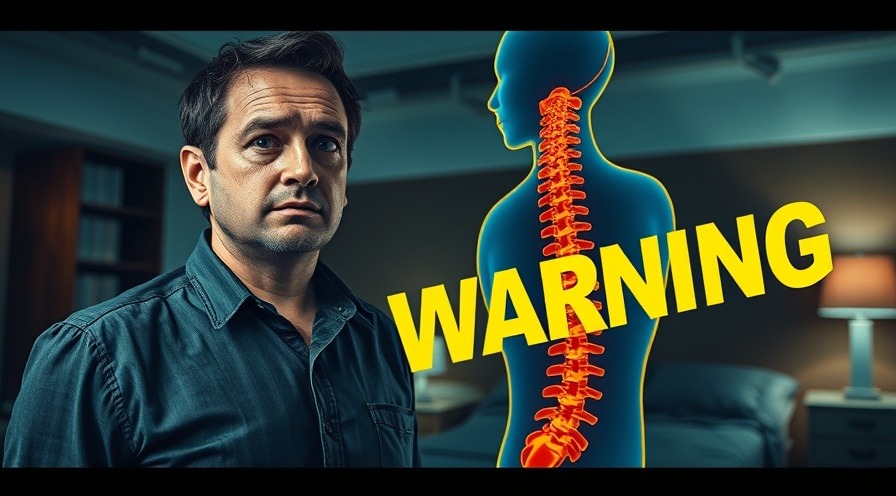
Recognizing the Sleep Threats for Seniors
Sleep is essential for everyone, but for seniors, maintaining a good sleep routine becomes crucial as health complications can arise from seemingly harmless habits. As discussed in the video SENIOR, STOP These 9 DEADLY Sleep Habits: It's Slowly Killing You!, we uncover the often overlooked damaging habits that can threaten health while sleeping.
In SENIOR, STOP These 9 DEADLY Sleep Habits: It's Slowly Killing You!, the discussion dives into crucial nightly practices for seniors, exploring key insights that sparked deeper analysis on our end.
Understanding the Importance of Room Temperature
One foundational aspect of good sleep is the room temperature. Research by the National Institute on Aging points out that older adults should aim for a bedroom temperature between 60-67°F (15-19°C). This temperature regulation not only promotes relaxation but also aids in moving into deep, restorative sleep, which is essential for immune support and tissue repair.
Heating your room too much can lead to issues like dehydration since seniors often struggle to sense thirst due to age-related changes. Consequently, this can strain the heart, leading to significant risks like irregular heartbeats or even strokes. To sleep better, it’s helpful to wear breathable fabrics and keep air circulation consistent.
Beware of Getting Out of Bed Too Quickly
Another common practice that can lead to serious problems is rising too quickly. Seniors can experience orthostatic hypotension, which occurs when the body fails to manage blood pressure upon standing. This sudden dizziness can result in dangerous falls.
As a solution, it's advisable to take a moment to sit on the bed before standing up, wear supportive slippers, and keep hydrated with water. Setting up motion-activated lights can also ease the journey to the bathroom, reducing hazards during nighttime.
The Risk of Late Night Hydration
While it’s essential to stay hydrated, drinking excessive fluids right before bed can lead to frequent bathroom trips and disrupt sleep cycles. This issue is compounded by the natural bladder control decline that comes with age. Falling in the dark can escalate into trauma or hospitalization, which is a major concern for older adults. Therefore, it's recommended to drink most water earlier in the day and just sip a little if feeling thirsty at bedtime.
Pills at Dusk: A Double-Edged Sword
The timing of medication can cause unexpected pitfalls. Many common drugs such as sleep aids or anti-anxiety medications may depress the central nervous system, leading to shallow breathing—especially for those with pre-existing conditions. Seniors should always consult with their healthcare providers about timing adjustments and explore alternative remedies, like relaxation techniques, that may not have side effects.
Shifting Eating Habits: Timing and Health
Eating later at night can lead to complications such as acid reflux, disrupted sleep, and increased blood sugar, all of which are particularly harmful to seniors. Instead, it’s beneficial to finish dinner at least three hours before bed to allow for proper digestion. Making healthier late-night snack choices can also make a wonderful difference.
Adjust Your Sleep Position for Safety
Sleep position is crucial; it impacts breathing, blood flow, and overall comfort. Most experts recommend side sleeping, especially on the left side, as it enhances blood flow and support for heart health. Proper alignment can prevent disruption, enhancing sleep quality and promoting bodily repair, which is vital with age. This brief adjustment can yield tremendous benefits for seniors.
Addressing Snoring and Insomnia: Look for Answers
Disruptive sleepiness and pronounced snoring can indicate obstructive sleep apnea, a condition that is often underdiagnosed but carries serious risks for cardiovascular health. If nighttime breathing issues arise, consulting a doctor may prompt significant lifestyle and health changes. Incorporating proper treatments and looking for healthy lifestyle adjustments can create a healthier sleep environment.
Overall, keeping an eye on your sleep habits is not just about comfort; it can guard against serious health risks. If you or someone you care about relates to any of these habits, consider making small adjustments to pave the way for improved health. Remember, with a little awareness and effort, it’s never too late to enhance your sleep and overall well-being. Reach out to your healthcare provider for personalized advice and a plan that suits your lifestyle!
 Add Row
Add Row  Add
Add 




Write A Comment